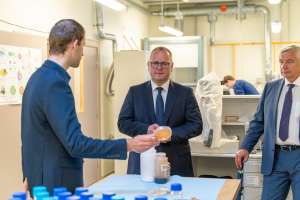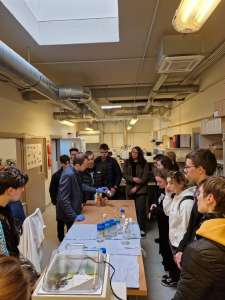Herbicides as tool for selection of edible protein-rich mutants
Single cell proteins (SCPs) are a good alternative to replace agricultural proteins because SCP production is more environmentally friendly, consumes less water, requires less land and SCP can be produced from agro-industrial by-products. SCP-producing microorganisms are the basis of all SCP technological solutions, therefore improving the properties and productivity of these strains is vital for increasing the competitiveness of SCP technologies.
In this project, the authors propose a new technique to generate SCP-producing strains. This technique would use amino acid inhibitors (herbicides) to exert selective pressure on the resulting mutant strains. Mutants that grow fastest on selective media will show higher total protein concentrations and/or improved amino acid profiles.
The project will start with a multi-criteria analysis to identify the most suitable strains, mutagenesis methods, amino acid inhibitors and the composition of the culture medium made from agro-industrial by-products. The selected clusters will be tested in the laboratory, where the SCP yield and production efficiency of the generated mutant strains will be evaluated. Life cycle analysis will be performed on the group that has shown the best results in the experiments.
The results will be used to strengthen intellectual property rights, further develop the technology concept, prepare new project applications and scientific publications, introduce entrepreneurs, society and students to the developed technology and prepare recommendations for legislators.
PROJECT FUNDED BY:
Latvia’s state budget Fundamental and Applied Research Project
Project No. lzp-2022/1-0126
PROJECT DURATION:
April 1, 2023 – March 31, 2026
PROJECT BUDGET:
300 000.00 EUR
SCIENTIFIC LEADER OF THE PROJECT:
Valdis Vītoliņš
PUBLISHED:
01.05.2023.
On October 17, 2024, leading researcher Ilze Vamža talked about the project within the presentation “Transition to bio-based industries” within the framework of the Korea-Latvia Climate Tech Partnership Seminar.
On October 4, 2024, professor Jeļena Pubule led a lecture in the study course “Environment and Climate Guide” for about 300 students about biotechnology, including the technology worked on in the project.
On March 6, 2024, during the visit of professor Farouk YALAOUI from the University of Technology of Troyes (UTT), leading researcher Krišs Spalviņš presented the biosystems laboratory and the project “Herbicides as a tool in the selection of protein-rich mutants”.
On January 27, 2024, researcher Indra Bērziņa presented the biosystems laboratory and the technology developed in the framework of the project “Herbicides as a tool of edible protein-rich mutants” during the open day event.
On November 27, 2023, the leading researcher Krišs Spalviņš took part in the Latvian Radio 1 program “Known in the unknown”, where he shared his experience on the topic “Waste on the sea coast. Values in landfills and production by-products”.
You can find the recording of the program HERE.
On October 10, 2023, leading researcher Krišs Spalviņš introduced the biosystems laboratory during the visit of Professor Giorgio Maria Zamperetti of the University of Insubria.
On August 30, 2023, the Minister of Climate and Energy Raimonds Čudars visited the Riga Technical University (RTU) with the parliamentary secretary of the ministry Kārlis Šadurskis and colleagues. During the visit, the minister and his colleagues visited the Biosystems Laboratory of the Institute of Energy Systems and Environment (VASSI) of the RTU Faculty of Electrical and Environmental Engineering, where assoc. prof. Krišs Spalviņš presented the guests with the technology of the “Herbicides as tool for selection of edible protein-rich mutants” project.
On May 19, 2023, the leading researcher Krišs Spalviņš told about the biosystems laboratory during the visit of the leading researcher Henna Knuutils of Turku University of Applied Sciences.
On April 19, 2023, leading researcher Krišs Spalviņš spoke about biotechnologies in the study course “Environment and climate guide” implemented at the Riga Technical University, of which the technologies worked on in the project were also included.
SCIENTIFIC PAPERS
2024
- Bērziņa, I., Kalniņš, M., Geiba, Z., Raita, S., Paļčevska, J., Mika, T., Spalviņš, K. Creating Single-Cell Protein-Producing Bacillus subtilis Mutants Using Chemical Mutagen and Amino Acid Inhibitors. Scientifica, 2024, Vol. 2024, No. 1, Article number 8968295. e-ISSN 2090-908X. Pieejams: doi:10.1155/sci5/8968295
- Mika, T., Kalniņš, M., Spalviņš, K. The use of droplet-based microfluidic technologies for accelerated selection of Yarrowia lipolytica and Phaffia rhodozyma yeast mutants. Biology Methods and Protocols, 2024, Vol. 9, No. 1, pp.1-23. ISSN 2396-8923. Pieejams: doi:10.1093/biomethods/bpae049
- Raita, S., Bērziņa, I., Kušnere, Z., Kalniņš, M., Kuzmika, I., Spalviņš, K. Herbicide-based selection of mutants for improved single cell protein synthesis: application and procedures. Agronomy Research, 2024, Vol. 22, No. 1, pp. 1-26. ISSN 1406-894X. Available: doi:10.15159/ar.24.060
- Bērziņa, I., Raita, S., Kalniņš, M., Spalviņš, K., Kuzmika, I. In search of the best technological solutions for creating edible protein-rich mutants: a multi-criteria analysis approach. Agronomy Research, 2024, Vol. 22, No. 1, pp. 370-400. ISSN 1406-894X. Available: doi:10.15159/AR.24.039
- Bērziņa, I., Raita, S., Kalniņš, M., Spalviņš, K., Kuzmika, I. Supplementary Data to the Article “In Search of the Best Technological Solutions for Creating Edible Protein-Rich Mutants: a Multi-Criteria Analysis Approach”. Agronomy Research, 2024, Vol. 22, No. 1, pp. 1.-1. ISSN 1406-894X. Available: doi:10.15159/eds.art.spl.24.01
SCIENTIFIC CONFERENCES
2024
- May 16 | international scientific conference The 17th International Scientific Conference of Environmental and Climate Technologies CONECT 2024 | Riga, Latvia | Jeļizaveta Paļčevska (ex Šaronova) | Creation of single cell protein-producing mutants of Phaffia rhodozyma
- May 16 | international scientific conference The 17th International Scientific Conference of Environmental and Climate Technologies CONECT 2024 | Riga, Latvia | Liega Krasovska | Analysis of bibliometric data to identify trends in yeast research
- May 9 |international scientific conference Biosystems Engineering 2024 | Tartu, Estonia | Indra Bērziņa | In search of the best technological solutions for creating edible protein-rich mutants: a multi-criteria analysis approach
- May 9 | international scientific conference Biosystems Engineering 2024 | Tartu, Estonia | Svetlana Raita | Herbicide-Based Selection of Mutants for Improved Single Cell Protein SyntheApplication and Procedures
2023
- May 12 | international scientific conference The 16th International Scientific Conference of Environmental and Climate Technologies CONECT 2023 | Riga, Latvia | Linda Feldmane | Compilation of groups of mutagens used to obtain optimized yeast strains
- May 12 | international scientific conference The 16th International Scientific Conference of Environmental and Climate Technologies CONECT 2023 | Riga, Latvia | Svetlana Raita | Mutagenesis and selection strategies of SCO and carotenoid producing microorganisms
- May 11 | international scientific conference The 16th International Scientific Conference of Environmental and Climate Technologies CONECT 2023 | Riga, Latvia | Accelerating Microorganism Strain Selection for Enhanced Productivity: A Review of Microdroplet Technology Solutionsfor Screening Mutant and GMO Strains





